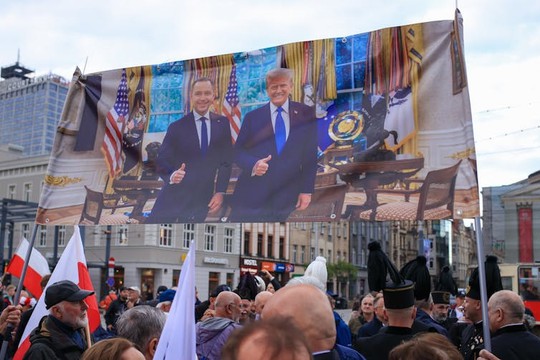Supporters of Karol Nawrocki hold a banner featuring a picture of the Oval Office meeting between US President Donald Trump and Nawrocki.
Photo: PAP
Poland’s presidential election runoff will be a bitter pill for pro-European Union democrats to swallow, writes ‘The Conversation’.
The nationalist, Trumpian, historian Karol Nawrocki has narrowly defeated the liberal, pro-EU mayor of Warsaw, Rafał Trzaskowski, 50.89 to 49.11%.
The Polish president has few executive powers, though the office holder is able to veto legislation. This means the consequences of a Nawrocki victory will be felt keenly, both in Poland and across Europe.
With this power, Nawrocki, backed by the conservative Law and Justice party, will no doubt stymie the ability of Prime Minister Donald Tusk and his Civic Platform-led coalition to enact democratic political reforms.
This legislative gridlock could well see Law and Justice return to government in the 2027 general elections, which would lock in the anti-democratic changes the party made during their last term in office from 2015–2023. This included eroding Poland’s judicial independence by effectively taking control of judicial appointments and the supreme court.
Nawrocki’s win has given pro-Donald Trump, anti-liberal, anti-EU forces across the continent a shot in the arm. It’s bad news for the EU, Ukraine and women.
For much of the post-second world war era, Poland has had limited European influence.
This is no longer the case. Poland’s economy has boomed since it joined the EU in 2004. It spends almost 5% of its gross domestic product on defence.
Poland now has a bigger army than the United Kingdom, France and Germany. And living standards, adjusted for purchasing power, are about to eclipse Japan’s.
Along with Brexit, these changes have resulted in the EU’s centre of gravity shifting eastwards towards Poland. As a rising military and economic power of 37 million people, what happens in Poland will help shape Europe’s future.
Poland’s new position in Europe is most clearly demonstrated by its central role in the fight to defend Ukraine against Russia.
However, Poland’s unqualified support for Ukraine will now be at risk because Nawrocki has demonised Ukrainian refugees in his country and opposed Ukrainian integration into European-oriented bodies, such as the EU and NATO.
I experienced the proximity of these borders during fieldwork in Poland in 2023 when I travelled by car from Warsaw to Vilnius, the Lithuanian capital, via the Suwalki Gap.
This is the strategically important, 100-kilometre-long border between Poland and Lithuania, which connects the Baltic states to the rest of NATO and the EU to the south. It’s seen as a potential flashpoint if Russia were ever to close the gap and isolate the Baltic states.
Poland’s conservative nationalist politicians are therefore less Russia-friendly than those in Hungary or Slovakia. Nawrocki, for instance, does not support cutting off weapons to Ukraine.
A Nawrocki presidency will still be more hostile to Ukraine and its interests. During the campaign, Nawrocki said Zelensky “treats Poland badly”, echoing the type of language used by Trump himself.
After the surprise success of the liberal, pro-EU presidential candidate in the Romanian elections a fortnight ago, pro-EU forces were hoping for a similar result in Poland, as well.
That, for now, is a pipe dream and liberals across the continent will now need to negotiate a difficult relationship with a right-wing, Trumpian leader in the new beating heart of Europe.
read more in our Telegram-channel https://t.me/The_International_Affairs

 11:37 04.06.2025 •
11:37 04.06.2025 •























